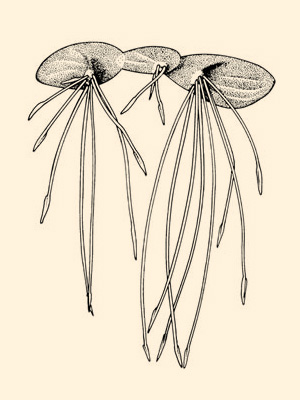Q. What are the best control options?
A.Herbicide treatments work when it comes to controlling duckweed. Duckweed is a common pond issue. Use the correct product, apply it per label directions and you will be happy with the results. We are always here to help guide you before and encourage you to contact us following your treatment to ensure every future application meets your goal. See next Q & A - Which Herbicide When? for product recommendations.
Other Control Methods It is our opinion that some techniques work as a complement to aquatic herbicide treatments, such as aeration/fountain systems or bacterial treatments, but will not replace the need for a herbicide maintenance program. We know of no skimming technique or equipment that will successfully control Duckweed.
Q. Which herbicide when?
A.#1 Clipper Why do we like it so much? It's fast by "real" world standards and blazingly fast compared to other product options. Generally, two weeks or less fast. It also controls a handful of common submerged weeds. If your pond also contains Watermeal (Wolffia), Clipper becomes "The Choice". It has the added bonus of a very short irrigation restriction - not more than five days.
#2 Alligare generic or original brand
Sonar: These are great brands. They each contain the same active ingredient Fluridone; we use it daily in our infield service division. It is broad spectrum; it controls most submerged plants in addition to Duckweed. It does require a long contact period of at least two weeks. For that reason it should not be used in ponds with significant out flow, unless you can sequester the water. A bit of water exchange or an average rain event won’t hurt, but if there is constant out flow or the pond is subject to flushing we do not reccomend this product. Fluridone can take three to six plus weeks to achieve results, but it offers a high level of control and the longest term control - sometimes lasting a full season. When applying you do not have to get perfect coverage because of the long absorbson rate. Simply apply as best you can.
#3 Reward is a fairly quick control agent. Reward is absorbed quickly by Duckweed and control is typically achieved within two weeks. Attempt to contact as much duckweed as possible when applying, using a hand held or backpack sprayer. It is a good economical choice and a killer on most submerged weeds as well - it may require repeat treatments for thourough Duckweed control, especially on ponds that support a lot of emergent growth where Duckweed can hide.
Remember: We are always available to help you solve your aquatic problems.
Q. When is the best time to treat?
A.Duckweed must be present to treat. Earlier in the day is best. Avoid water temperatures less than 50º. As long as the plant appears viable/active results should be excellent.
Q. How do I apply the product(s)?
A.Clipper is a granulated formula that easily mixes with water. It comes with a measuring cup - mix with water and apply to surface area allowing for even distribution. Effective concentration levels drop fast with Clipper so go the extra mile to get as good of coverage as possible. Always see the label for exact directions. Apply with a handheld or backpack sprayer.
Apply Alligare, Sonar or Reward with a hand held or backpack sprayer. Mix the dose with enough water to help facilitate distribution around the pond. It is not important with Alligare or Sonar to contact all the Duckweed - just get it in the water. Its long contact time will take care of even distribution. Contacting as much Duckweed as possible enhances Reward applications.
A Great Tip: Back pack sprayers cost more but they hold more product, get the job done faster, spray farther and are much easier to use than carrying a hand held sprayer. Once you use a backpack sprayer there is no going back – You can use it for all your yard weed control and fertilizer applications too. Always triple rinse spray tanks after each use! If you are an occasional user the hand held sprayer can get the job done too.
Q. How often do I need to treat Duckweed?
A.Many environmental factors determine regrowth when it comes to Duckweed On average, treating only one to three times within a season can be common depending upon product choice, environmental factors and your geographical location. With our professional products and thirty-five plus years of experience, we’ll help you achieve the results you desire.

